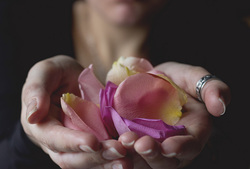Under water there is clarity, too. Detaching means holding your nose and breath and letting the depth pressure insulate you. It means going where the current takes you, and when you fixate long enough on something blurry, it will suddenly glimmer clearly, a fish catching sunlight, and each time I can get a little closer to it. Pull me out too quickly, I’ll lose that trail; I’ll only remember the outline of that glimmer, but I won’t be able to paint its scales. I'm always conscious of this when I interrupt others in the middle of their thoughts. I know the world is important to see, to live in, to respond to, but sometimes there is something inside ourselves we need to understand in order to float on, undisrupted.
|
Sixty percent of the process is swimming through yourself. I'm sinking my hands into muddy sand at the bottom, digging for sand dollars, fearing something sharp. My goggles gradually defog the more I seek what is behind one thought and another and another. I feel sometimes like when I start thinking, my thoughts are the rustle of water against my eardrums, and it takes so much effort to come back to the easy clarity of air –- it offends people that I need a few seconds to resurface, to rejoin them, to come back to listen when they call my name, but I'm not disinterested, just fighting against a strong current to come back.
Under water there is clarity, too. Detaching means holding your nose and breath and letting the depth pressure insulate you. It means going where the current takes you, and when you fixate long enough on something blurry, it will suddenly glimmer clearly, a fish catching sunlight, and each time I can get a little closer to it. Pull me out too quickly, I’ll lose that trail; I’ll only remember the outline of that glimmer, but I won’t be able to paint its scales. I'm always conscious of this when I interrupt others in the middle of their thoughts. I know the world is important to see, to live in, to respond to, but sometimes there is something inside ourselves we need to understand in order to float on, undisrupted.
0 Comments
In reading any fiction, such as Without Shame you must always ask Why. Why must Sariyah develop unrequited love? Why is Penelope, and the sexism she confronts, presented in the backdrop of this teaching experience? Why does Rodney assume his encounter with a man on the street made him sick? Why is Martin House fenced off, secluded, and why is there detailed attention paid to the materials it was built with, its amenities, and so forth?
Yet today, I want to focus on another question -- and that is, are the questions in the novel actually answered? Some may discern and interpret dialogue to arrive at an answer; they dichotomize perspectives (the American visitor versus the Bengali national) because perhaps that is the only way they can digest it. But this isn't what I recommend. Fiction is the one place we can create clear lines between villain and hero, protagonist and antagonist; yet I've done away with that. I've taken attitudes I've observed in my culture and written them into Rodney, not to vilify but to shed light, then allow the reader to decide. I have seen friends teach abroad and return home crowing about the people who loved them, proposed marriage to them, fawned over their wealth and whiteness; I've felt disgust and dismay at the arrogance that must go into descending on a place with the blunt intention of changing it without knowing it or, more distastefully, the belief they will improve it with their mere presence. Yet, while recalling these old conversations turns my stomach, and while Sajib would argue this is just another form of colonization, this is not always a cut-and-dry problem. Despite the inherent error in the "let the glory of my presence improve your life" attitude, there are certainly instances where meaningful connections are made when one human helps another, where both lives are forever altered in a positive way. There are certainly nuances described in this novel that are not ubiquitous and experiences, differently executed, that result in better outcomes. There are organizations doing things right, too. There are well-meaning people and well-run programs, too. There are people who do good, well-informed work with love and free of that arrogance I described, too. There are various sides of the debate, too. The presentation of this tension is supposed to confuse and conflict. We are supposed to question the sincerity of the dynamic between Rodney and Sariyah, Rodney and Sajib, Rodney and his students. And we are supposed to arrive at - maybe not the answer to but - a queasy yet more complete understanding of "why." Okay, writers! Here's a short video with a few tips on character creation.  I am struggling with the self-promotion part of being an author. There are so many voices in this world, so many fascinating perspectives and important issues to consider, so I'm usually playing the role of listener. Aren't writers supposed to help make sense of all those voices, rather than compete with them? I continuously feel pressed to make up my mind about myriad topics, vast and myopic, based on information I take in all day long -- is it unethical to buy quinoa from certain distributors? What information do I need to form a stance on fracking, and whose stats can I trust? Should I take my friend seriously when he proclaims to be a men's rights activist? Should I read that David Sedaris book on my desk first or On Human Nature - which will benefit me more as a person and writer? More info on Syria, click. An op-ed on machoism in the movie industry, click. An analysis of gun violence in the U.S., click. An inspirational piece about a man who tried to helicopter around the Arctic Circle, click. "10 Ways to Reduce and ReUse," click. Sign our petition to end solitary confinement of pregnant inmates!, click. With so many voices, I find I am increasingly distracted. Writing is an act of centering myself, of returning to my own voice and locating my perspective in the midst of everyone else's. Publishing is an act of promoting this expression, which is where I have found some discomfort. There is a constant debate of whether we have raised or lowered the bar for all writers by making publishing so accessible; on one hand, the competition is fiercer and one would hope that the best will rise to the top naturally (a capitalistic view?), but on the other hand, it offers a soap box for ideas not fully formulated, for more noise to block out what we all need to hear. Writing should be a modest endeavor, but publishing is inherently not, no matter how much you believe in what you are saying. That is why I am always on edge about posting blog posts and participating in Twitter and Facebook, i.e. Writer Promotion 101. Am I adding to the noise? Am I saying what has already been said? Will people benefit from what I say? While I'm chattering, what am I missing? Writers always have to balance this desire to listen but also be heard. We might wrestle with this sense of perfectionism in what we put out there, as well as a yearning for quietude against a need to stay relevant by weighing in. The question is, When do you weigh in? At what point have you gathered enough information where you have a place to publish on a given topic? And at what point do you know that what you are saying hasn't already been said in some way? I think the answer is we must create our own space wisely; we must accept that we can only write to the extent that we understand, and that has limits. I think as long as I write as honestly as possible and to the best of my ability at that moment, I can be proud of what it is and accept wherever it may end up - or if it will not be read at all. Such a philosophy can be problematic. Squeaky wheel gets the oil, right? I am learning how to strike a balance between maintaining quality in what I put out there and committing hefty time to "catching a break" by being a louder voice in the crowd. This involves breaking out of my comfort zone and talking about my writing more through different outlets. It also involves trying to making myself recognizable to readers who are looking for something specific. It is good for every writer to find a niche. Stephen King fans know where to turn when they're craving horror or supernatural fiction. He has perfected his focus area to a degree, and that is how he markets so well. When I read big authors like Barbara Kingsolver, Chimamanda Adichie, Junot Diaz, Cara Black, or Margaret Atwood, I know pretty much what I am getting because their style and genre are consistent. This type of recognition and branding makes their voice louder. At the same time, I don't want to be pigeonholed. I've written all over the place and don't feel like I want to settle just yet; I want to keep digging for new methods of expression so that maybe what I put out there will be different and newer than whatever else is available at that moment, without being avant garde. I want to keep learning, deciding, changing. I guess self-promotion makes it feel as though I've settled on that marketable voice, or that I am speaking out of turn when I would rather just focus on the craft. Gradually, I'm working through the crowd. You have an idea, maybe even an outline, maybe even the first few chapters, but that initial enthusiasm for writing your novel has worn off. Hear from author Katherine Russell on how to develop a mindset that will get you to the finish line. Excited about some new reviews of Without Shame:
"Katherine Russell has done a very fine job with her novel. The characters are plausible and the events as well as the themes the novel touches upon will provide many interesting discussion points among readers." -Book Fabulous "She [Russell] brings up pertinent issues of culture and language and how Colonialism affected people’s lives on these different levels. Moreover, she begs the question as to whether foreign education in developing countries actually works for the people or against them. I particularly enjoyed the intellectual debates between characters in the novel. One of the main characters Sajib, for instance puts forth the question as to whether English really is the language of progression and whether American education in East Pakistan was valuable or if it served to further strip the people from their culture...The political angle of the book did not overshadow the narrative and because it was so naturally written as part of the main story, it was not boring at all, instead it proved to be insightful." -Muslim Women Exposed "This book feels like it is set out for greatness. The book is written in a beautiful, almost poetic style, with a complexity of themes that I can imagine perfectly fitting in to a heated literary discussion as a high school or even a university setwork." -The Jozi WAHM Guide to Everything "Sariyah...starts working as a maid at Martin House, an American compound that brings American volunteers to teach the village people about agriculture, home economics, history, English and hygiene. There, she meets Rodney, a clueless, entitled, privileged (my opinion) teacher, who goes to teach in an attempt to avoid being drafted into the army...He thinks that things need to change in Eastern Pakistan and he thinks he knows how change should occur. He wants to bring “development” about...I saw the story as that of clashing patriarchies....white Western privilege is well and alive and that the rest of us continue to be subjects of “discovery,” “development” and of “saving.”" -A good analysis of Rodney's role in the book, by Eren of Muslimah Media Watch In the final weeks of waiting to see my finished book, I'm full of excitement, anticipation, and - the writer's curse - self doubt. Did I write a book that my friends and family will think is a worthy read? Did I create a work of fiction that will move complete strangers and provoke thought? Will it catalyze the right conversations? Every writer, at some point, is shaken by these fears. We're all afraid of being thought of as frauds (someone, somewhere is not going to like your style, or where you place your commas, or how you described that one character's 18th century cottage), slid under a microscope, every word scrutinized. That is because a good writer is also a harsh self-critic; it is rare to feel something is complete, absolute, and perfected. It has less to do with modesty than it does with a fear that all this time, energy, thought, research, and craziness you poured into a project might fall flat. If a tree falls and no one is around to hear it, does it make a sound? I wanted to bring someone's courage to life through Without Shame. It wasn't a Muslim girl, or a woman from a small Bengali village, or a naive English teacher determined to fix the things he doesn't understand - those details came from my curiosity about these lives and a desire to walk in their shoes. But I wanted to bring to paper what I know about pain, loss, and the things that can hinder or feed the human spirit. That includes what I believe about colonialism, and the things we continue to colonize. Of course, writers are also afraid of our work getting misinterpreted or read literally, but I can't influence my intended neocolonial interpretation indefinitely. First, I must trust that I have made it to this point through diligent work. I deleted more than I wrote. I sculpted carefully while I shaped my own worldview - the process of writing was a process of growth, of forming my own ideas. I reached out to Bengalis. I spent endless hours in libraries, getting lost in personal accounts by Peace Corps volunteers. How else do I have these strange facts floating in my mind, that I needed to use the word thana for "village" because the story takes place before the 1980s, before the word for "village" changed to upazila. These things you have to ask questions about when you write on a different era that you didn't live through. But secondly, as I await the launch of Without Shame, I must return to the poem that propelled me. When I lost direction, I returned to the words of Rabindranath Tagore. The poem below inspired and informed my themes and the truths I wanted to convey. It is inspiration for how I want to live life, and how I want my country to be. I found this poem after I began my novel, but it instantly sparked my purpose in writing it. You'll find these words in the front pages... Where the mind is without fear and the head is held high
Where knowledge is free Where the world has not been broken up into fragments By narrow domestic walls Where words come out from the depth of truth Where tireless striving stretches its arms towards perfection Where the clear stream of reason has not lost its way Into the dreary desert sand of dead habit Where the mind is led forward by thee Into ever-widening thought and action Into that heaven of freedom, my Father, let my country awake. -Rabindranath Tagore
 "Live patiently in the world knowing that those who hate you are more numerous than those who love you." -African proverb This might be a statement on human nature: how jealousy and grudging can overpower love, how most people in the end are self-interested. But I am reading this quote in a time when group hatred is pronounced and global. It rings in my ears as literal. My forthcoming novel Without Shame is a push for religious tolerance. Which is something I thought - no matter what culture or sect you practice from - would be a favorable lens on Islam in a time where you see headlines like "Secularist blogger brutally murdered in Bangladesh - the fourth one this year by Islamic groups." But my eyes were opened to something the other week, and it has to do with the quote mentioned above. I asked a Pakistani writer to review Without Shame, and after reading it, she declined. I believe she is Sunni, and she did not approve of my inclusion of Sufism and Bengali cultural practices, as she explained, "It's not mainstream Islam and many of their practices aren't backed by Quran and sunnah...there is no concept of evil or good spirits in Islam, or healing by chanting, etc. It is especially disturbing because at least some of the characters in the story (for instance Sajib) are religious and seem to have knowledge about their faith because they are educated, yet they are following and/or condoning these practices." She demanded I change the book or at least make a note that the book is not talking about true Islam, stating that non-Muslim readers "will take it as face value and grow in their belief that Muslims are weird, irrational superstitious, etc." First off, the basic thing this writer missed is that I am not speaking for all Islam; I am observing a part of Bangladesh. I sincerely believe that my readers are smarter than to take the book as a face-value representation of all Muslims. I think the general public has a basic understanding of Islam (its tenets are taught in grade school and high school world history classes), and when misconceptions arise, they are not over a belief that Muslims are superstitious in any way - rather, I think most prejudices by Westerners revolve around a misguided idea that Islam is a violent, intolerant religion. (An argument can be made that humans are inherently intolerant and violent, and our belief systems either keep our nature in check or are used as an outlet for it - reminding you there are violent extremist Buddhists, Hindus, Atheists, Christians, what have you, but that is a discussion for another day). Shamanism, the evil eye, and mystic healing are all practiced in Bangladesh, even by Muslims. It's my hope that my readers are analytical enough to see that Sufism and Bengali Mysticism must all co-mingle with Islam in the book as a point of cultural accuracy, and they are equally legitimate practices, not "weird." Furthermore, the book is not meant to be a statement on "the" Islam; it isn't meant to explain mainstream practices or sway the reader one way or another, except to think. It is a novel about a small, 1960s village in Bangladesh, where cultural practice and religion intermingle in their own unique way. Look anywhere, and you will see that culture brings nuances despite the defined religion - you will see that in Saudi Arabia, women can't drive, but Muslim women become doctors and leaders in other parts of the world; or you will see that 97% of (Christian and Muslim) girls in Egypt suffer from female genital mutilation, a practice people accidentally construe with Islam, but many Muslim and Christian activists are working ardently to change this. Hopefully, as people read about other cultures and religious nuances, they will be MORE equipped to distinguish religious practices from cultural tradition and not make generalizations about entire religious groups on a global scale. This is a fundamental tenet of my book: Culture is inseparable from religion - they are a part of each other. When East and West Pakistan were formed, it was based on a theory that all Muslims were the same, so they should live under the same Pakistan. Let's take a guess if that worked... No. Though they are majority Muslim, Bengalis had a separate and distinct way of life that didn't mesh with 1960s Pakistani law. On top of it, they were seen as inferior; they were abused and taken advantage of, re-colonized by West Pakistan, and that led to revolution. In a big way, this writer's feedback served to further validate this anti-theory, especially as a Pakistani Muslim woman reading about Bengali practices. The most perturbing thing about this other writer's response is that she wanted to dictate my portrayal of Muslims in Bangladesh to fit her belief in the "proper" Islam. At the very least, she said, I should have a note in the foreword telling my readers how to distinguish between culture and religion. Literature is supposed to reveal a part of life. It is not definitive. It is not the template of all reality. It is a peephole into someone else's truths. It is an insight into our connection, our differences, our humanity. It is supposed to show, not dictate. Hopefully, through that, we can become a more tolerant, empathetic, and loving people. But those who will read it will take it as they will. I am gearing up to read the first round of edits on my novel, Without Shame. I'm realizing my skin has gotten thinner since college. Perhaps I feel more vulnerable to failure. I used to do four workshops in a week. Whenever it was your turn to get workshopped, you sat there silently for a half hour as twenty other writers critiqued your work. Even if they said things you disagreed with or they completely misinterpreted your work, you had to swallow it. There was no rebuttal. A writer's easiest defense was to ignore their words. But I took every comment into consideration, even if it was to better understand general audiences or the possible interpretations a person could take from my work.
There is nothing healthier than that for a writer. Criticism keeps us on the ground, looking at our work critically so that we might bring it closer to perfection. In fact, I often shrug off compliments, or I take them very lightly, because I'm worried they'll destroy me - I know that a big ego blocks improvement, and it blinds artists from seeing themselves and the world honestly. It's good to get compliments here and there, though; they might offer some reassurance that you don't completely suck. Still, we must always continue reaching for our better selves. As I prepare myself to read those edits - which very likely will slash up this novel I've nursed for five years - I will keep these words in mind: "There's no good or bad. There's practice or no practice." -Based on an oracle Chinese saying and adapted by a modern-day American, my husband. (He's the lucky one who gets to talk me through this!) So I'm getting in the mindset. Tomorrow I will read over my editor's comments, and I will take them in stride, and my writing will get stronger. I will put my novel before my ego. I will remember that writing is and always will be a practice - finishing the novel wasn't the end game for me as a writer, and neither was finding a publisher. It is the role of my profession to continuously improve. |
AuthorKatherine Russell is an author, poet, activist, and freelancer from Buffalo, NY. Categories
All
Archives
November 2018
|



 RSS Feed
RSS Feed